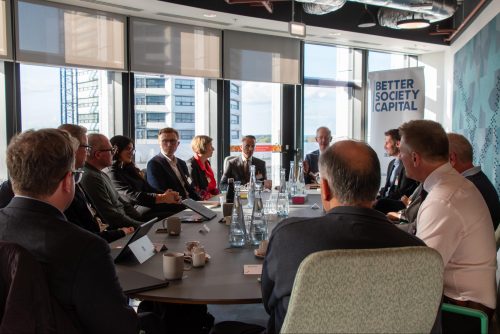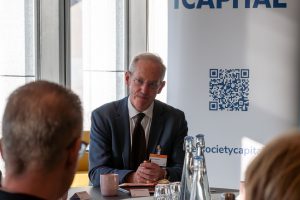West Midlands place-based impact investing

A group of senior stakeholders in the West Midlands region ranging from the public, private and social sectors came together to discuss the opportunity to scale up place-based investment into the West Midlands region. The round table has paved the way for further conversations on how capital can be directed to the West Midlands region and help stimulate a thriving social economy.
The roundtable started with a timely reminder of 3 reasons why it’s the right time to have this discussion on social impact investing in the West Midlands region. These are:
1. We have a mission-led government with bold ambitions but with limited financial resources
2. The program of devolution has meant the Combined Authorities have more autonomy, and
3. The current size of the social impact investment sector is £10bn at the end of 2023, which indicates a 12x growth over the last 12 years.
Jonathan Gibson from the West Midlands Combined Authority (WMCA) then provided some context to the region and shared details on the current strategic priorities of the combined authority and the role which private capital could play. He highlighted some key issues affecting the region such as child poverty, the housing crisis, the need for better transport and improving adult skills.
Matt Smith, the CEO of the leading social investor Key Fund then went on to share his 4 barriers to scaling up social investment, which all helpfully begin with the letter ‘C:’
1. Confidence – there is often a trust deficit between the social investor and investee. Building trust on both sides of investor and investee is key. The perception from social enterprises that social investment costs too much money needs to be addressed.
2. Capability – in some cases, there is a skills deficit among social sector organisations, and there needs to be a commercial mindset.
3. Capacity – this work does take time and there is often an added cost which should be offset by grants. There are challenges inherent within any social investment model and there needs to be flexibility in the model to make it work.
4. Capital – there is enough money out there going to a home, but we need more risk-tolerant capital to blend and scale up social impact investment solutions. It’s a supply-side issue but demand is still the biggest challenge.

However, the bank recognised that as a UK-grown and established bank which has a local presence across the UK; they had an important role in tackling UK regional inequality and helping grow regional productivity. When deciding which investment areas to focus on, Lloyds looked at the success the US Community Development Institution sector has had on local communities and wanted to replicate this success in the UK context.
Poverty exists across the UK, however, CDFI lending is one lever which can help reach underserved businesses and help combat poverty. Chris shared that his ambition is for the UK CDFI sector to grow from where it is currently at £120m to £1bn and for that growth to be stimulated by more mainstream financial institutions investing. Fortunately, there are several levers opening up for the growth of the CDFI sector – these being:
• Our current receptive government
• Blended Finance becoming more popular – public/philanthropic capital coming together with private, non-concessionary capital
Chris closed by sharing that he wants to replicate and scale the Lloyds CDFI model across more regions in the UK.
Rosie Ginday, founder of Miss Macaroon and Tony Wood, Head of Credit at BCRS, went on to reflect on their experience of providing loan finance to Miss Macaroon in 2016. Rosie reflected that social investment helped create and grow the business model for Miss Macaroon. The investment helped the enterprise expand training from back of house to front of house giving direct retail experience to beneficiaries. BCRS helped make the complicated process of applying for and receiving social investment easier, the patient capital they provided was essential to her organisation’s growth and subsequent deepening of impact.
Following this, the conversation opened up to the wider group from which several themes emerged. It was worth noting that there can be confusion amongst investors between social investment and impact investing and that the two need further clarification to encourage balanced growth across these sectors.
Champions on the ground are needed to help drive awareness and solutions to problems in their area through social investment. This has been done successfully in areas where social investment has been able to scale such as Manchester. Who can be the champions for social investment in the West Midlands?
Catalytic capital is needed for the scaling of social investment solutions in the region. This early-stage, patient capital which is willing to take more risk or even able to provide first-loss capital needs to be in place for a variety of reasons but primarily because it can leverage other forms of non-concessionary capital and ultimately scale up the impact. Which investors can provide this catalytic capital essential to the growth of this market?
Connecting with the right partners around the table was another theme highlighted as important. Does the public sector have a key role to play? Can the local higher education sector play a role in the debate or be a partner in assessment? What types of investors are needed?
Co-designing a social investment solution is also a key part of achieving a thriving, scaled-up social marketplace, with different stakeholders on both sides working together and inputting into social investment solutions, long-term commitment is needed in this process of co-design. Liverpool was one such area which was highlighted as being able to co-design a solution and successfully build in capital layers.
The culture of the region was highlighted as an important feature in the development of a social impact investment market. We need to ask whether other places and areas have more enterprising cultures and whether there needs to be a culture shift to help stimulate support for the social economy. Is there a culture gap affecting the growth of the social economy through social investment in the West Midlands?
It was emphasised that the West Midlands is a place that has the people and resources to scale up and create a social investment marketplace which works for all. However, it requires significant action and a clear conversation about what’s possible in both the short, medium and long term. Key champions are needed to drive the growth of this sector and so the group concluded by agreeing to further the conversation from this roundtable discussion and meet again to collaborate on practical next steps.









